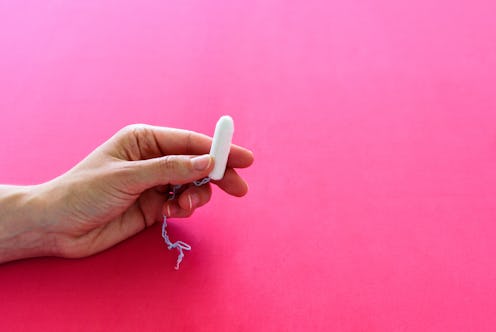Life
Is It Safe To Delay Or Skip A Period?

It seems as though just about every person who gets a period ever has wondered, "Is it safe to delay my period?" at some point in life. While the internet is full of opinions as to how best to pull this off, the science suggests that, well, your best bet is going to be birth control — but changing around your birth control in order to delay your period is not dangerous.
"Presuming you're not pregnant, it's really pretty safe to fiddle around with your period," Dr. Mary Jane Minkin, a clinical professor in the Department of Obstetrics, Gynecology, and Reproductive Sciences at the Yale University School of Medicine, tells Bustle over the phone.
Dr. Minkin explains that the process of delaying or skipping your period starts with ovulation, which is when your ovaries drop an egg around halfway through your cycle in the hopes of getting fertilized by an errant sperm. If an egg hangs out in your uterus and doesn't get fertilized, your body sheds the egg and your uterine lining — your period! — and the process starts over again. Most hormonal birth control stops the process of ovulation, because if you don't release an egg, you can't get pregnant. (Interestingly, this is why the "period" you get during the placebo week of birth control pills isn't actually a period — it's technically called a withdrawal bleed.)
Because of its outsize influence on ovulation, birth control is going to be the best and safest method to delay your period. "There are all sorts of ways to manipulate birth control pills," Dr. Minkin says. "The easiest way is just to skip the placebo week." That means, if your pill pack comes with 21 active pills and seven placebos, or 24 active pills and four placebos, or any other combo, you would just take all the active pills and then start on your next pack without taking the white sugar pills. Make sure to use the little sticker that comes in your birth control box to label the next pack with the correct days of the week, so you can double check you've taken them every day.
This method is overwhelmingly safe, says the Mayo Clinic — you won't "build up" hormones in your body, and you do not need to "clear out" your system at the end of the month. You can use the Nuva ring or the patch the same way to prevent a period — just swap our your ring or patch for a new one, instead of taking a week "off." You might experience "breakthrough bleeding," or light spotting, with these methods, so consider using period underwear if you want to prevent leaks.
There are other options for using birth control to delay your period, such as extended-cycle birth control pills, Depo-Provera (or the shot), the implant, or a hormonal IUD. Each of these methods, called Long-Acting Reversible Contraceptive (LARC), work similarly to taking birth control without a "withdrawal" week— the hormones in the birth control prevent ovulation continuously, thus preventing a period. Dr. Minkin says around 20% of people with a Mirena IUD won't get any periods, and around 60% will have "substantially lighter periods." (Paragard, aka the copper IUD, prevents pregnancy by making the uterus inhospitable to sperm, not by preventing ovulation, so it will not stop your period.)
If you're not on birth control, you may have heard that things like stress, drinking water, living with other period-havers, or even gram lentils can delay your period. While there's some (small, old) studies that show that women who live together can sometimes sync up their cycles, most science that has since tested that finding has found that, in fact, that's not the case. And though you may remember from school that stress, exercise, or weight changes can affect your period, Dr. Minkin says it's probably not a good idea to try to wield these outside influences to change your period.
"If you are stressed, the whole delicate [hormonal] balance from the hypothalamus and the pituitary gland gets screwed up, and people stop ovulating," she says. This process can also mess up future periods, making them harder to control.
So, if you're wondering how to delay your period for an upcoming trip or event, your best bet is the well-timed application of birth control. But it's also worth remembering that, well, it's OK to let your body bleed when it plans to do so, as long as it's not uncomfortable for you. If your period symptoms are painful to the degree that they interfere with your daily life, talk to your doctor about a medication regimen that can help you manage your periods better. But period or no period, you will have a monthly menstrual cycle. This is just the way it is. It's up to you to decide if you feel like having a period this month or not — but menstruation stigma doesn't need to have a say in that process.
Experts
Dr. Mary Jane Minkin, MD, clinical professor in the Department of Obstetrics, Gynecology, and Reproductive Sciences at the Yale University School of Medicine
Studies Referenced
Yang, Z. (2006). Women do not synchronize their menstrual cycles. Human Nature, 17(4), 433–447. doi: 10.1007/s12110-006-1005-z
Weller, A. (1992). Menstrual synchrony in female couples. Psychoneuroendocrinology, 17(2-3), 171–177. doi: 10.1016/0306-4530(92)90055-c
Additional reporting by Eden Lichterman
This article was originally published on